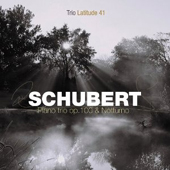
ESSENTIAL RECORDINGS

Unlike Beethoven who would tackle a musical phrase from every possible angle, twist it around, flip it upside down, re-evaluate
it at every turn, and repeat it verbatim only once he was satisfied it had been completely metamorphosed, Franz Schubert
had a tendency to latch on to a melodic fragment or harmonic modulation, and make it the home plate to which he would repeatedly return to.
Whereas Beethoven would often stray far away from port over rough seas before returning home, Schubert would circle the bay, and quickly
return to the safety of the harbor. The two works on this new CD, the Piano Trio in E flat major, Op. 100, D. 929
and the Adagio for Violin, Cello and Piano in E flat major, Op. posth. 148, D. 897 ("Notturno"), both from the
composer's final year, are perfect examples of this. And therein lies the charm, beauty and simplicity of Schubert's music. His succinct melodic lines
always capture the essence of his thoughts, and seem to benefit from repetition.
The list of superlative recordings of this music, played by the who's who of trio ensembles, is exhaustive to say the least. The Borodin Trio, the Beaux Arts Trio,
the Gryphon Trio, the Kalichstein-Laredo-Robinson Trio, the Florestan Trio, the Vienna Piano Trio, etc ... all have something interesting to bring to the table,
which makes my assessment of this new Eloquentia recording by the young ensemble Trio Latitude 41 all the more
challenging. Let me start by saying that for their maiden voyage unto the rough and unpredictable seas of the recording world, this is a very auspicious beginning.
Like the famous tale of the three bears, some of the other performers are either overly delicate, or overly heavy-handed, while the Trio Latitude 41 seem to get
the balance of emotions and intellect just right. For example, pianist Bernadene Blaha always switches roles flawlessly from leading voice
to background support, and never, even when she shines as in the final movement of the op. 100, steals the spotlight all to herself. Cellist Luigi Piovano
and violinist Livia Sohn are so in sync with each other, that at times you would think that they've put together a mechanical contraption moving both
their bows as one. The 1710 Gagliano cello projects a warm and singing tone, and outdoes all other contenders for lyricism and beauty of sound, in the wonderful
Andante con moto of the trio. And as a group, they demonstrate an uncanny ability of moving from subdued whispers to impassioned outbursts, as if of
one mind. They see Schubert as the 'troubadour' that he was. Simple, humble, and from the heart.
These two chamber works, written by a composer who, by the age of 30, had already given the world Winterreise, can certainly stand to have more than
their fair share of recordings, especially when they are as good and rejuvenated as this one.
Jean-Yves Duperron - February 2012